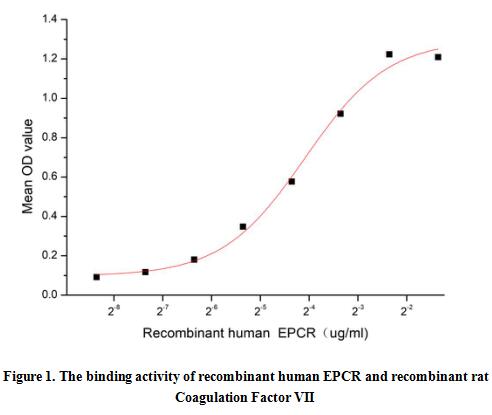Active Endothelial protein C receptor (EPCR)
CD201; PROCR; CCCA ;CCD41; BA42O4.2; EPCR; Endothelial Protein C Receptor; Cell Cycle, Centrosome-Associated Protein; Activated Protein C Receptor
- Product No.APA022Hu02
- Organism SpeciesHomo sapiens (Human) Same name, Different species.
- Buffer FormulationPBS, pH7.4, containing 0.01% SKL, 5% Trehalose.
- TraitsFreeze-dried powder
- Purity> 80%
- Isoelectric Point6.7
- ApplicationsCell culture; Activity Assays.
- Download Instruction Manual
- UOM 10µg50µg 200µg 1mg 5mg
-
FOB
US$
For more details, please contact local distributors!US$
For more details, please contact local distributors! US$
For more details, please contact local distributors! US$
For more details, please contact local distributors! US$
For more details, please contact local distributors!
ACTIVITY TEST of the Active Endothelial protein C receptor (EPCR)

Endothelial protein C receptor (EPCR) also known as CD201, is a transmembrane glycoprotein expressed on vascular endothelial cells and functions as a negative regulator of thrombosis. It is expressed most strongly in the endothelial cells of arteries and veins in heart and lung. Mature human EPCR consists of a 193 amino acid (aa) extracellular domain (ECD), a 21 aa transmembrane segment, and a 7 aa cytoplasmic tail. Within the ECD, human EPCR shares 63% and 66% aa sequence identity with mouse and rat EPCR, respectively. EPCR inhibits thrombosis through its interactions with Protein C, activated Protein C (APC), and Coagulation Factors VII, and VIIa. Thus a functional binding ELISA assay was conducted to detect the interaction of recombinant human EPCR and recombinant rat Coagulation Factor VII (F7). Briefly, EPCR was diluted serially in PBS with 0.01% BSA (pH 7.4). Duplicate samples of 100 μl were then transferred to F7-coated microtiter wells and incubated for 1h at 37℃. Wells were washed with PBST and incubated for 1h with anti-EPCR pAb, then aspirated and washed 3 times. After incubation with HRP labelled secondary antibody for 1h at 37℃, wells were aspirated and washed 5 times. With the addition of substrate solution, wells were incubated 15-25 minutes at 37℃. Finally, add 50 µL stop solution to the wells and read at 450/630nm immediately. The binding activity of recombinant human EPCR and recombinant rat F7 was shown in Figure 1, the EC50 for this effect is 0.06 ug/mL.
USAGE of the Active Endothelial protein C receptor (EPCR)
Reconstitute in 10mM PBS (pH7.4) to a concentration of 0.1-1.0 mg/mL. Do not vortex.
STORAGE of the Active Endothelial protein C receptor (EPCR)
Avoid repeated freeze/thaw cycles. Store at 2-8°C for one month. Aliquot and store at -80°C for 12 months.
STABILITY of the Active Endothelial protein C receptor (EPCR)
The thermal stability is described by the loss rate. The loss rate was determined by accelerated thermal degradation test, that is, incubate the protein at 37°C for 48h, and no obvious degradation and precipitation were observed. The loss rate is less than 5% within the expiration date under appropriate storage condition.
INCREMENT SERVICES
BCA Protein Quantification Kit
Molecular Mass Marker for Protein
Monoclonal Antibody Customized Service
Polyclonal Antibody Customized Service
Protein Activity Test Experiment Service
Electrophoretic Mobility Shift Assay (EMSA) Experiment Service
Buffer
Lentivirus Packaging Experiment Service
Adenovirus Packaging Experiment Service
Real Time PCR Experimental Service
Spike RBD Protein (S-RBD)
Protein G
Protein A
Related products
| Catalog No. | Organism species: Homo sapiens (Human) | Applications (RESEARCH USE ONLY!) |
| APA022Hu02 | Active Endothelial protein C receptor (EPCR) | Cell culture; Activity Assays. |
| RPA022Hu01 | Recombinant Endothelial protein C receptor (EPCR) | Positive Control; Immunogen; SDS-PAGE; WB. |
| PAA022Hu01 | Polyclonal Antibody to Endothelial protein C receptor (EPCR) | WB; ICC; IHC-P; IHC-F; ELISA. |
| LAA022Hu71 | Biotin-Linked Polyclonal Antibody to Endothelial protein C receptor (EPCR) | WB; IHC; ICC. |
| MAA022Hu22 | Monoclonal Antibody to Endothelial protein C receptor (EPCR) | WB; IHC; ICC; IP. |
| SEA022Hu | ELISA Kit for Endothelial protein C receptor (EPCR) | Enzyme-linked immunosorbent assay for Antigen Detection. |
| LMA022Hu | Multiplex Assay Kit for Endothelial protein C receptor (EPCR) ,etc. by FLIA (Flow Luminescence Immunoassay) | FLIA Kit for Antigen Detection. |

